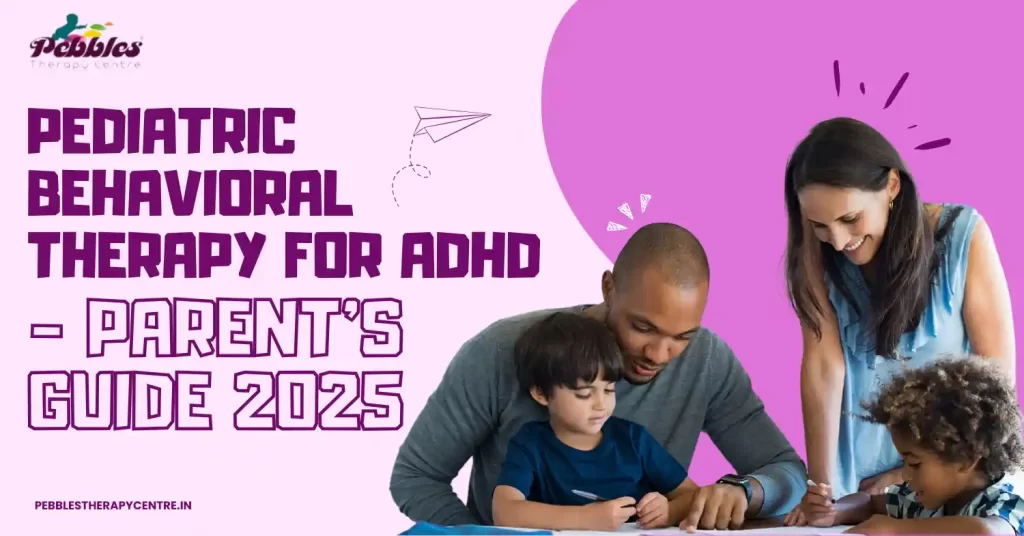Pediatric Behavioral Therapy for ADHD - Parent's Guide 2025
Raising a child with ADHD can be difficult, but using appropriate tools can improve symptom management. Behavioral therapy for ADHD is considered a reliable and effective treatment option among the various available treatments. This manual will assist parents in comprehending different behavioral therapies, their advantages, and how they can effectively aid their child in conquering the hurdles of ADHD.
What is ADHD?
ADHD stands for Attention Deficit Hyperactivity Disorder and is a neuro-developmental disorder impacting numerous children globally. The following symptoms characterize ADHD:
- Inability to focus; very easily diverted or distracted (inattention).
- Restlessness or being unable to stay still, seated, or on a playground (hyperactivity).
- Impulsive action without thinking about the consequences of one’s action (impulsivity).
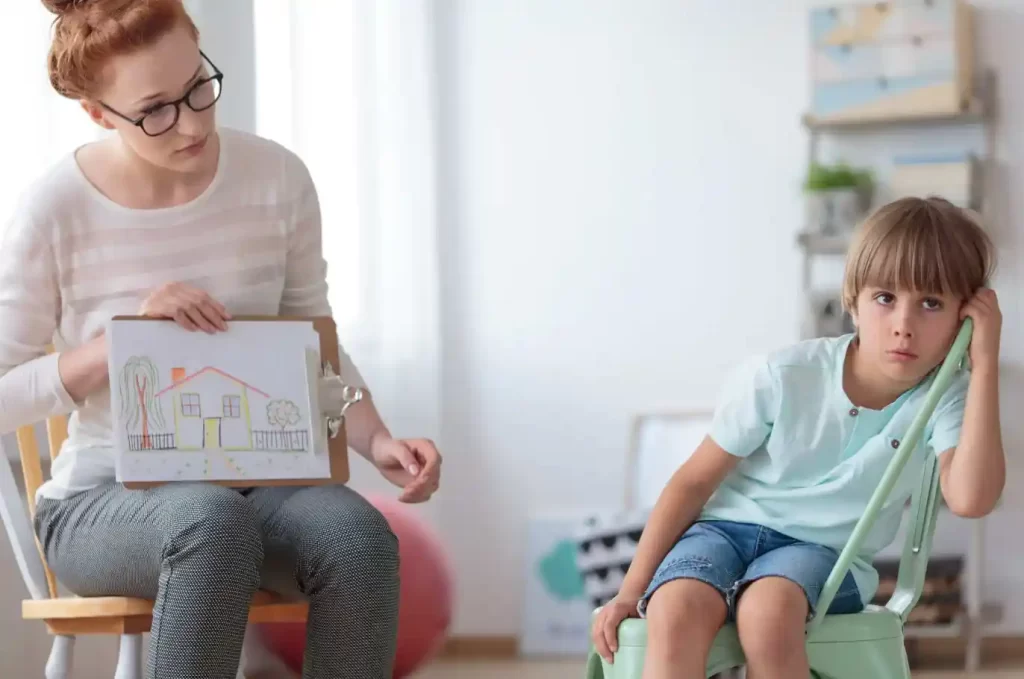
Untreated ADHD may cause negative effects in a child’s educational performance and other relationships as well as his overall well-being. Stress, frustration, and other related mental health issues crop up not only in the child but also in his family.
They help reduce the symptoms almost overnight, for a short time while leaving to combination of ADHD medication and therapies will cause long-term relief. Specifically, when the former is combined with behavioral treatment for ADHD, improvements in children make the difference.
Why Behavior Therapy is Important
Behavioral therapies are notorious for helping children with ADHD become empowered with some self-regulation techniques that help build their resilience. These make interactions inside their environment smoother. With persistent application, these therapies yield a noticeable improvement in a child’s overall growth.
What is Behavioral Therapy?
Behavioral therapy is a structured attempt to change children’s actions, emotions, and thought patterns. It is most beneficial for managing the symptoms of ADHD. Therapists teach children:
- Gain mastery over their emotions.
- Replace inappropriate behavior with constructive activity.
- Acquire better social and communication skills.
Behavioral therapy promotes reinforcing positive behavior by making children aware of behaviors that might impede their daily lives.
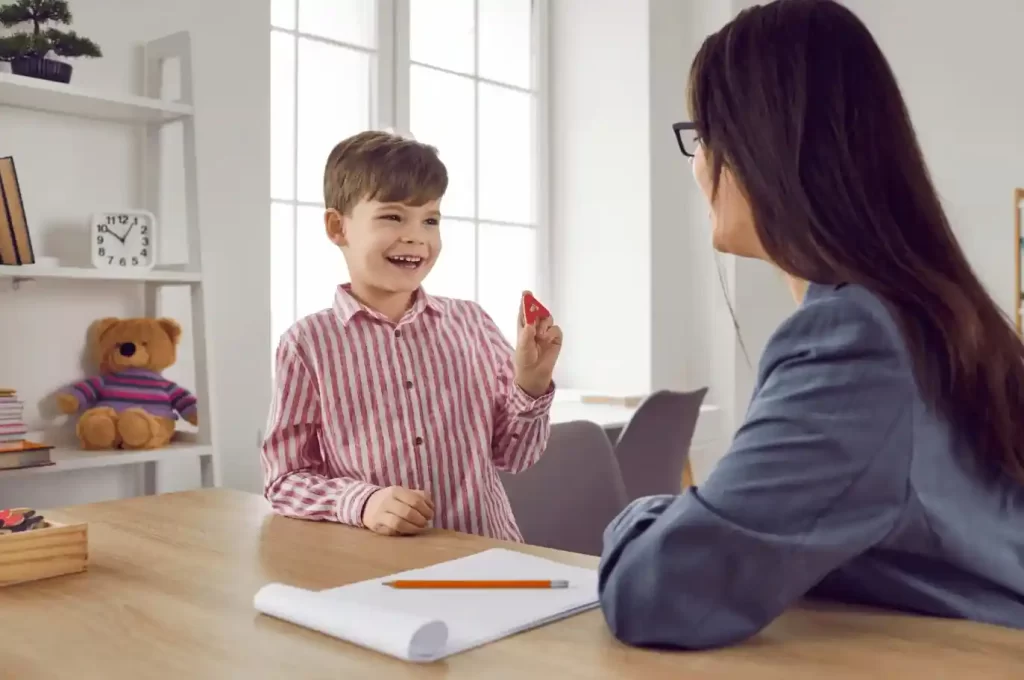
Therapy Beyond the Session
Parents need to know how behavioral therapy impacts their lives. Most therapies have a parent training component as well, so parents can support the new skills in the home environment. This works to create consistency needed to bring relief to a child with ADHD.
Behavioral therapy in Chennai also ultimately gives the child independence in handling the social, academic, and emotional tasks.
Types of Behavioral Therapy for ADHD
There are numerous kinds of behavioral therapy for ADHD. Different therapies are available for addressing various needs, as specified below:
- Applied Behavior Analysis or ABA Therapy:
- ABA therapy for ADHD involves a rewards system for the encouragement of good behavior and discouragement of negative behavior.
- Effective for attention deficit hyperactivity disorder applied behavior analysis techniques.
- Cognitive Behavioral Therapy (CBT):
- The Cognitive behavioral therapy for ADHD child acknowledges the maladaptive beliefs and replace them with healthy behaviors for the ADHD-afflicted child.
- It is more useful in the treatment of impulsivity and emotion-related problems.
- Parent Child Interaction Therapy (PCIT):
- In this treatment, parents are trained on healthy interaction skills with the child while simultaneously modifying their approach in handling the disruptive child behavior.
- Behaviour Modification:
- It involves reinforcing strategies like charts and rewards, among other things, in a child with ADHD for the enhancement of specific behaviors.
All the above types of therapies have been able to address specific challenges that can be tailored to the need of the child, hence making them versatile management treatments for ADHD symptoms.
Benefits of Behavioral Therapy for ADHD
While benefits of behavior therapy for children with ADHD encompass much beyond controlling the symptoms alone, it may change the life of children or even their families.
- Improved focus and attention.
- Reduced aggression or impulsiveness.
- Enhanced emotional control.
- Greater contact with the social environment.
- Long-term management without medication.
For example, strategies of cognitive behavioral therapy for ADHD help children to be well prepared in advance before dealing with crucial conditions. Moreover, ABA for ADHD also teaches children problem-solving skills and decision-making, which enables them to act as the owning managers of their behavior.
Implementing the behavioral therapy and ADHD management strategy into daily routines, parents are in an unshakeable position of confidence of emotional balance of the child.
How Does Behavioral Therapy Help Children with ADHD?
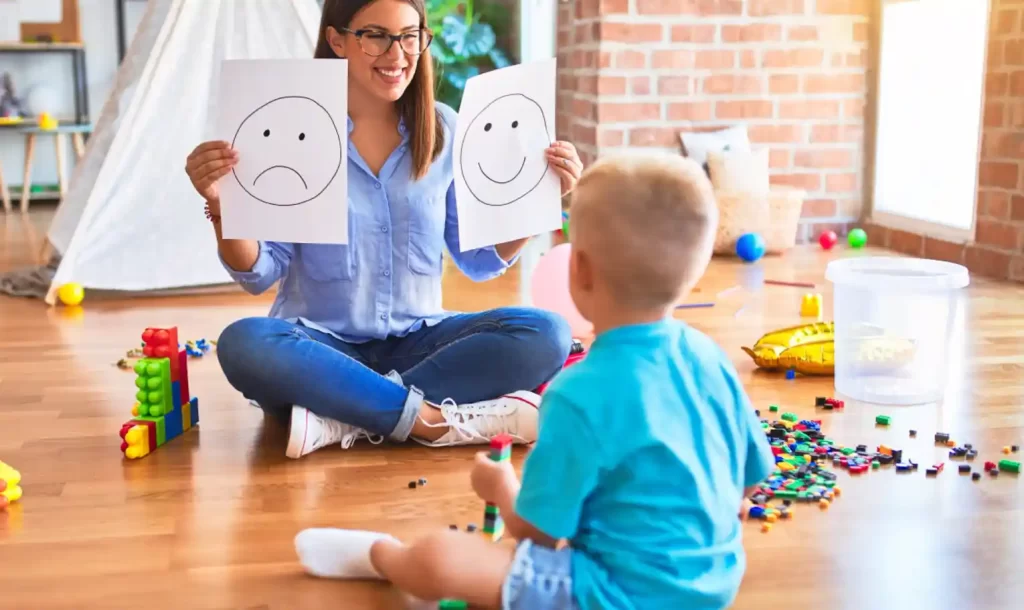
Behavioral therapy for ADHD children provides useful skills to deal with the problems these children face daily. The focus of therapists concerns specific areas of problems, and therapists formulate strategies fitting to a child’s issues.
Key Ways Therapy Helps
- Building focus techniques: Techniques such as breaking tasks into smaller pieces make it easier to tackle complex tasks.
- Emotion control: By teaching the children how to control their emotions, frustration and anger are decreased.
- Social interaction skills: Therapists employ role-playing exercises to teach children appropriate behaviors for different situations.
Check out 10 Sensory Play Ideas for Children with ADHD. For example, an intervention like visual schedules or using timers can assist a child with lack of attention and monitor the belongings.
Behavioral therapy & Pediatric ADHD therapy also gives strength to mental health by reducing anxiety and develops confidence, so that children will not find difficulty in managing themselves in school and social environments.
Teaching children with ADHD to become independent, these therapies enable them to grow up successfully in their surroundings.
When Should You Consider Behavioral Therapy for ADHD Children?
Early intervention is important in dealing with ADHD. Knowing the signs and initiating suitable behavioral therapy for ADHD children an early age improves the outcome significantly.
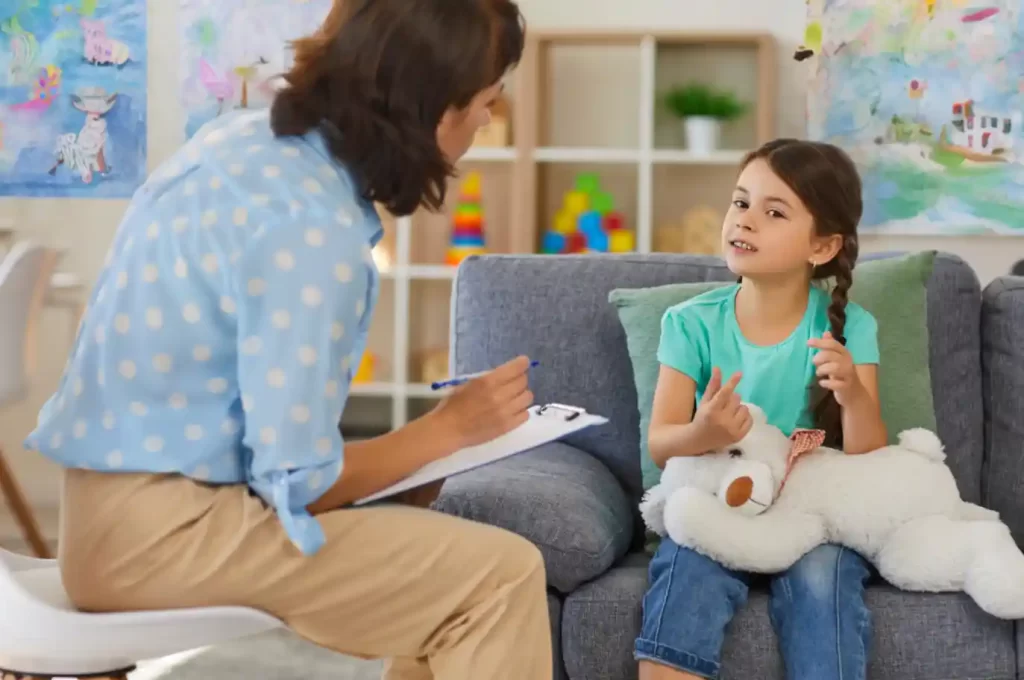
Signs Your Child May Need Behavioral Therapy
- Persistent inattention: Unable to focus on work despite instructions repeated a number of times.
- Hyperactivity: He cannot keep still, especially in formal environments.
- Aggressive behavior: Prolonged occurrence of aggressive behaviors or the inability to control emotional responses.
- Social problems: Cannot keep friends or relationships, due to the impulsive/disruptive behavior.
- Struggles with routines: Problems following daily schedules or completing chores.
Why Early Intervention Matters
- Children are more receptive to learning new behaviors when intervention starts early.
- Prevents long-term issues like poor academic performance and strained relationships.
- Helps build foundational life skills like stress management and good communication.
Combining Therapies
In many cases, therapists recommend combining behavior therapy for ADHD inattentive type with medication to maximize benefits. Additionally, involving support groups and providing parent training helps parents understand their child’s needs better.
Taking prompt action ensures that children can thrive despite the challenges of ADHD, making therapy an essential step in their developmental journey.
How are Parents Involved in Behavioral Therapy?
Parents form the most crucial component to ensure that behavior therapy for children with ADHD works as expected. Their involvement ensures continuity and strengthens skills practiced in therapy.
How Parents Can Involve
- Parent training: Therapists typically instruct parents on how to use systems of rewards and proper communication techniques to regulate behavior.
- Structured setting: Predictability reduces distractions and enhances focus among child with ADHD.
- Positive Reinforcement: Small achievement encouragement builds confidence and urges repetition of good behaviors.
- Regular Follow-up: Therapy sessions with the child help parents know whether they are doing well or not.
- Modeling wanted behaviors: The learning mechanism of children is based on observation; hence, parents must show patience and control of emotions.
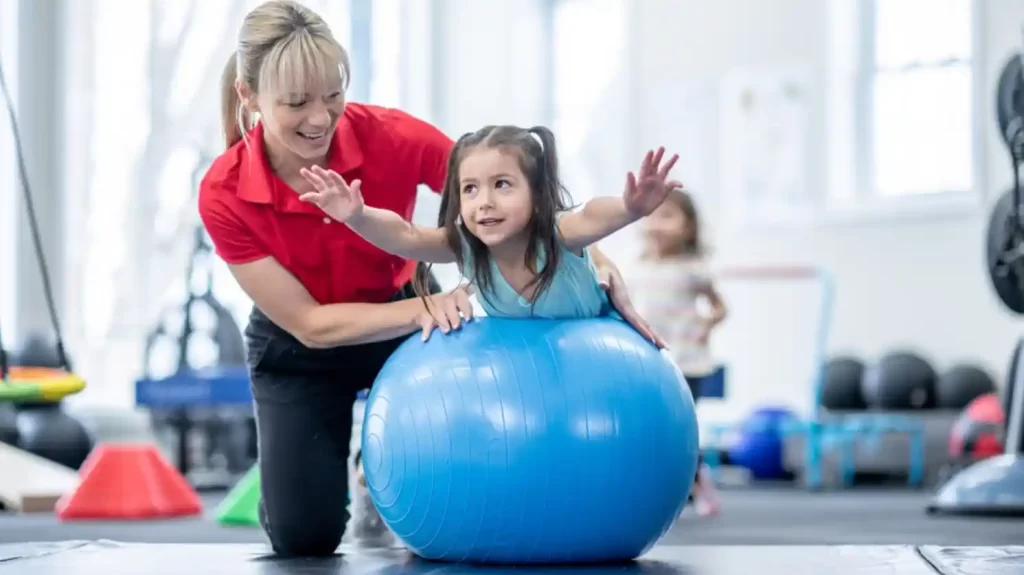
The Outcome of Involving Parents
This can create a helpful home environment when the parents actively join therapy, and this is what the child learns to apply in the home environment while learning these skills in therapy; hence, better symptoms overtime.
In this case, a parent who puts ABA techniques into practice at home will see the child having fewer outbursts and being more cooperative.
Check out the 9 Child Behavioral Therapy Techniques Parents Need to Know.
Parental participation not only strengthens the children but also equips them with strength to perform daily operations, so it can be said that strengthening parent child bonding will make therapy more effective and rewarding for the parents. Hope these ADHD Behavior Therapy guidelines for parents helps. Check out 9 Reasons to Complete ABA Parent Training & How it Helps Kids.
What Makes a Good Cognitive Behavioral Therapy Plan for ADHD?
A well-designed cognitive behavioral therapy for ADHD plan addresses the child’s specific challenges while promoting their strengths. The plan focuses on achievable goals and tracks progress over time.
Elements of an Effective CBT Plan
- Clear objectives: Setting realistic goals, such as improving attention spans or reducing impulsive behaviors.
- Skill development: Teaching coping mechanisms like deep breathing for emotional control.
- Behavior tracking: Monitoring improvements and identifying patterns in behavior.
- Parental involvement: Engaging parents in exercises to reinforce learned behaviors.
- Regular evaluations: Adapting the plan based on the child’s progress and challenges.
Customizing CBT Plans
The therapists provide custom designs to every child. For example, a child who erupts very frequently might be given lots of techniques involved in anger management, while another child who gets distracted easily may be given something on task prioritization.
In addition, CBT interventions commonly involve relaxation exercises that also relieve stress but also increase mental well-being while reducing anxiety in children with ADHD.
By addressing core issues and fostering positive behaviors, a strong CBT plan sets the foundation for long-term success.
How Behavioral Therapy Teaches Focus to Children with ADHD?
Focus is one of the very first difficulties for a child with ADHD. The way behavioral therapy for ADHD works to solve this issue is by dividing any task into smaller steps and then teaching practical techniques to maintain focus in the long run.
Improving Focus Techniques
- Task segmentation: It is the process of dividing large tasks into segmented forms so that it does not overwhelm the child.
- Visual schedules: Define passage of time and completion of activities using charts or timers.
- Positive reinforcement: Help children repeat their successes, especially the ones emphasizing attention.
- Mindfulness: Teach children to concentrate on objects and less distracted.
- Minimal distractions: Develop a distraction-free and quiet space for learning.
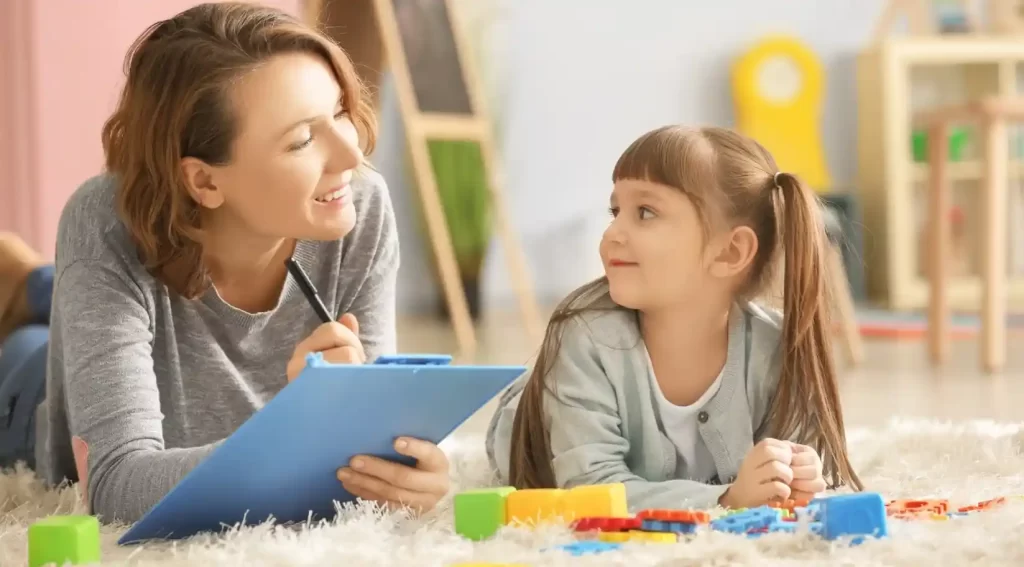
Role of Therapists and Parents
Mostly, therapists collaborate with parents who implement these skills to foster attention at home. For example, using timers during homework helps children remain aware of their progress and limits frustration.
By consistently practicing these techniques, children develop better concentration skills, allowing them to excel in school and social interactions.
5 Important Tips to Help Your Child Control Their Behavior
The children suffering from ADHD require strict consistency and structured techniques to behave well. Here are five tips on behavior management for parents:
- Set clear rules: Consistency makes the children understand what is expected.
- Positive reinforcement: Reward the good behavior right on time to encourage repetition.
- Achievable goals: Break up the large tasks into smaller, achievable milestones.
- Increase exercise: All exercises decrease hyperactivity and increase their ability to focus.
- Teach the management of stress: These include teaching the child deep relaxation techniques or mindfulness.
These interventions build their children’s capacity through a climate supportive of self-regulation. Over time, parents often notice improved emotional control and reduced aggression in their children.
Additionally, these tips align with therapy goals, ensuring children receive consistent support across all environments.
Pediatric Behavioral Therapy for ADHD Challenges & How to Overcome Them
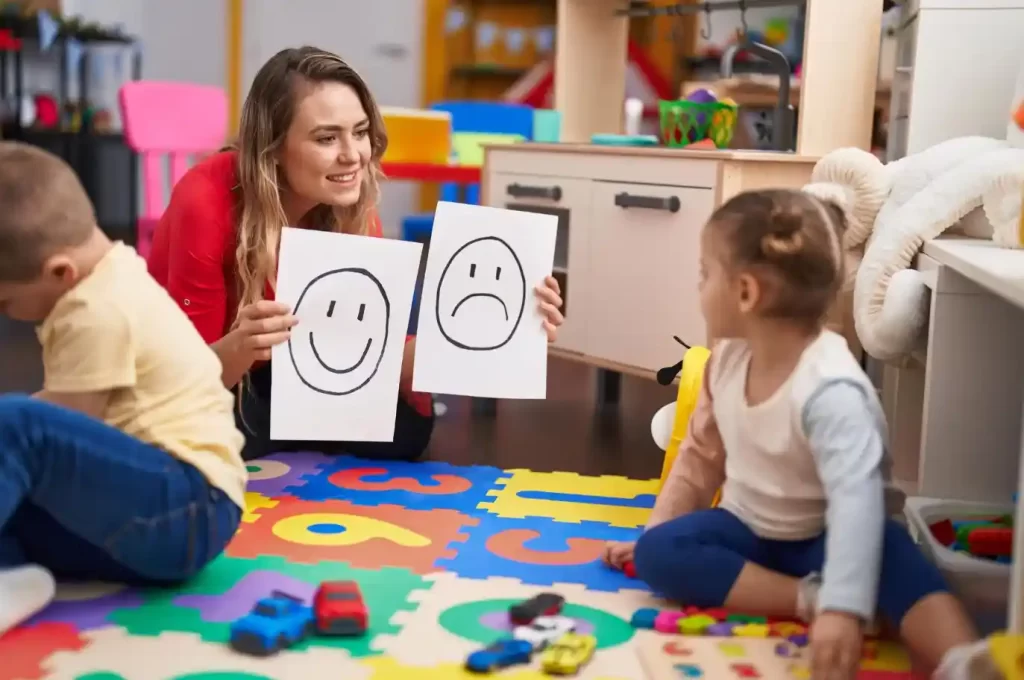
Although behavioral therapy for ADHD can be a successful treatment, parents may face difficulties such as slow improvement or opposition from their child. Nevertheless, the proper strategies for kids with ADHD can help conquer these challenges.
Common Challenges
- Lack of patience: Progress can take time, making it crucial for parents to remain consistent.
- Resistance to change: Children may struggle to adapt to new routines initially.
- Access to resources: Finding qualified therapists or support groups may be challenging.
How to Overcome Challenges
- Stay consistent: Regular practice and positive reinforcement ensure gradual progress.
- Seek support: Join parent groups or consult professionals for additional guidance.
- Adapt techniques: Tailor strategies based on what works best for your child.
Parents would have to be determined enough to ensure their child benefits from therapy while overcoming these hurdles for the child to thrive despite the challenge of ADHD.
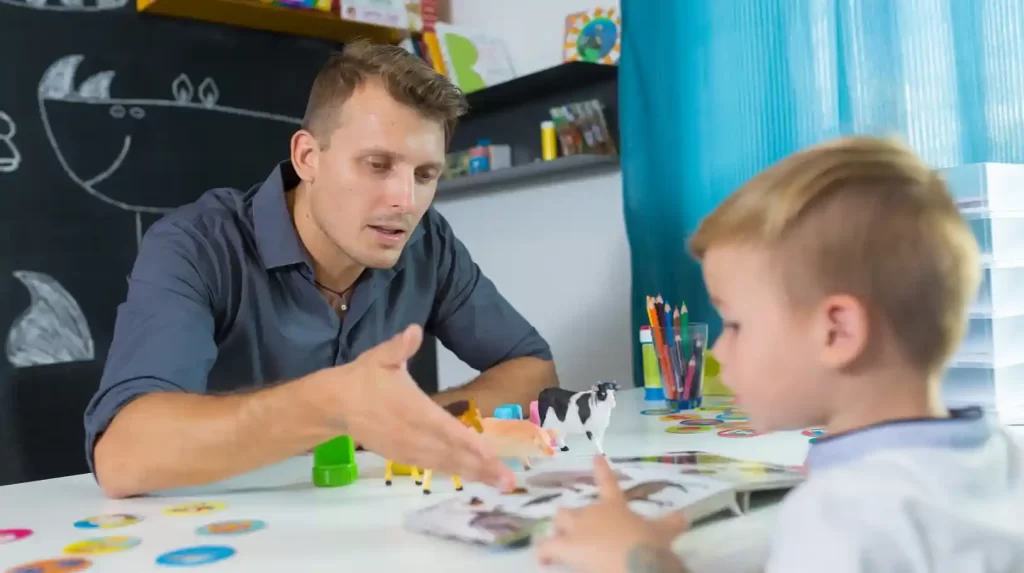
Life with a suffering child with ADHD is not easy, but behavioral therapy for ADHD equips children with skills for the management of symptoms and overall well-being. Early intervention combined with structured strategy and parental involvement allows for the development of focus, emotional control, and better social skills.
Consistent support and patience can empower children to overcome challenges and realize their full potential. Implementing stress management techniques along with CBT for ADHD will lead families down the path to creating a positive environment in which long-term success can flourish.
FAQs
Behavioral therapy for ADHD, such as attention deficit hyperactivity disorder cognitive behavioral therapy and ABA therapy for ADHD, is the most effective way to help a child with ADHD by improving attention, decreasing impulsivity, and addressing challenging behaviors.
The 5 C’s of ADHD parenting-Consistency, Clarity, Calmness, Communication, and Collaboration-help in the course of behavioral therapy for an ADHD child and introduce structure in the environment with a view to regulating ADHD symptoms.
Even though the brain matures during the mid-20’s, children with ADHD may have their maturation process delayed in places related to focus and impulse control. This is where Behavior therapy for child ADHD can prove to enhance these areas during childhood.
Cognitive behavioral therapy for ADHD and ABA therapy for ADHD have been well-proven to be effective. For children who are classified under special needs, such as for those who may benefit from behavior therapy for ADHD inattentive type, these therapies can be highly responsive to alleviating certain symptoms of inattention.
The first-line treatment of ADHD includes most cases making use of the combination of behavior therapy for ADHD together with medication. To children who come in more aggressively, behavior therapy for aggressive child in ADHD can be employed to facilitate emotional regulation and improvement in behavior.

